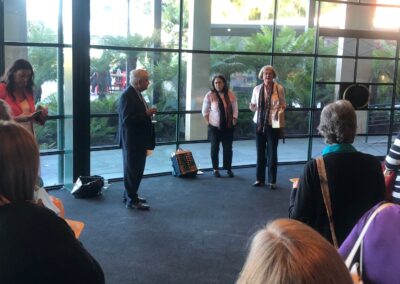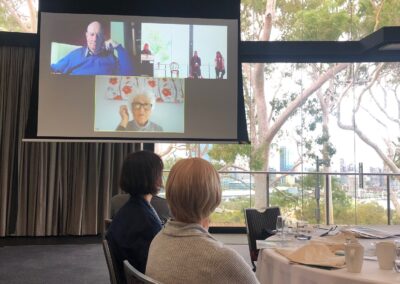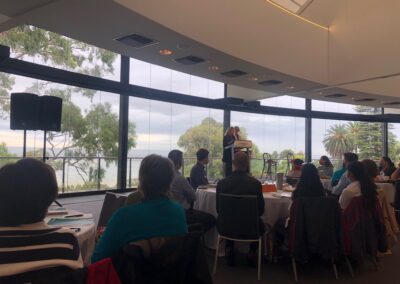Health in the Margins Conference
Blog by Miika Coppard, Research Officer PHAIWA
Australia is one of the safest places in the world to give birth or be born[i]. For most families, pregnancy and childbirth is a happy time. But for some, it can be incredibly challenging and at worst, heartbreaking.
Maternity care is fundamental to the health of society[ii]. It is well established that the first 1,000 days are a time of tremendous potential and enormous vulnerability[iii]. This is because the first 1,000 days are when a child’s brain begins to grow and develop and when the foundations for their lifelong health are built.
While a significant majority of Australian families are able to ensure both mother and baby are nourished and cared for during this time, there are some families that do not have access to the same level of maternity or child health care. This is largely because of and reinforced by socio-economic disadvantage.
Aboriginal and Torres Strait Islander women, women from culturally and linguistically diverse backgrounds, women living in regional, rural and remote areas, teenage mothers and women who experience family violence are all more likely to experience poorer outcomes during pregnancy and childbirth[iv].
_____________________________________________
On 5th May 2021, Living Child Inc and the Australian College of Midwives (ACM) hosted the Health in the Margins Conference – Empowering Communities Here and Abroad. The event was galvanising. It was a fantastic call to action, with keynote speakers reminding us very powerfully that it is time for change!
After a warm Welcome to Country from Aunty Marie Taylor, Rev Tim Costello AO addressed hundreds of mask-wearing-participants at Frasers Restaurant in Kings Park via Zoom. Rev Costello shared his reflections on public health and social justice issues in light of the COVID-19 pandemic. “Our borders may be shut but our hearts aren’t. We need to increase international aid.” The audience was reminded that although we are very lucky in Australia, where the incidence of SARS-CoV-2 has remained low, our neighbours, near and afar are sick and dying. “We have an ethical responsibility for people, wherever they are.” “Human rights are universal. We are interdependent. We are literally all in this together.”
Papua New Guinea (PNG) is separated from the most northern part of Australia by less than four kilometres of sea. In Australia, the Maternal Mortality Rate (MMR) is 6 deaths per 100,000 women giving birth[v]. In PNG, the MMR is 145 per 100,000[vi]. Women in PNG are more than 24 times more likely to die from complications during or following pregnancy and childbirth. Most of these complications are preventable or treatable[vii].
Also joining the conference via Zoom, Prof Fiona Stanley AC reminded us that in both countries, even further disparities exist. The MMR for Aboriginal and Torres Strait Islander women is 20.2 per 100,000[viii]. This is unacceptably high. There needs to be greater investment at the beginning of life to prevent health and social inequity. For example, if we diagnose fetal alcohol spectrum disorder (FASD) early, and treat it, we can prevent some of the lifelong impacts it has on young people, particularly Aboriginal youth, such as confinement within the criminal justice system[ix],[x].
Fiona (as she insisted she be called) went on to raise the incredibly exceptional First Nation response to the COVID-19 pandemic in Australia. Following the H1N1 pandemic, and as soon as we knew the COVID-19 pandemic was coming, Aboriginal Community Controlled Health Organisations (ACCHOs) created relationships and set up controls to protect their communities. This time around, they were more in control – they were actually at the table! ACCHOs got personal protective equipment (PPE), the ability to screen and their health promotion videos were funny, culturally appropriate and worked! We would have expected about 1,000 cases of COVID-19 in our Aboriginal and Torres Strait Islander population, given their vulnerability. So far, there have only been about 150 cases, one person in ICU and no deaths – a complete reversal of the gap. This has been one of the best responses to the pandemic in the world. “The evidence from the pandemic is that if we give Aboriginal people a voice, they get it right!”
Melanie Robinson, the Director of Aboriginal Health at the Child Adolescent Health Service in WA took the podium next. Mel reinforced earlier notions from Fiona that it is rare to see good news stories about Aboriginal people in the media. There is so much strength in Aboriginal communities, but the media consistently focus on the dysfunction. “There is so much more that can be done to engage and collaborate with Aboriginal people.” This is an area that PHAIWA has been forging a road in. PHAIWA has now produced ten WA Indigenous Storybooks. The storybooks showcase the many positive community-based projects occurring in rural and remote Aboriginal communities and celebrate people who are contributing to the social, economic, health and environmental outcomes for their people.
Australia is the only Commonwealth nation without a treaty with our Indigenous people. The absence of a treaty or constitutional recognition suggests ongoing denial of the existence, prior occupation and dispossession of Indigenous people in Australia and highlights a lack of engagement and relationship between Indigenous and non-Indigenous Australians[xi].
The lack of recognition of Aboriginal and Torres Strait Islander people in this country reinforces disadvantage. We can’t just cross our fingers and hope for better health outcomes (a larger aboriginal workforce, lower MMR etc.), we have to make practical steps to remove barriers to health.
“We must ensure that people living in the margins have the same access to health as the rest of us” proclaimed Sara David AM, Founding Chief Executive Officer, Living Child Inc.
Sara and Julie Hansen-Baleu, both from Living Child Inc. presented after the lunch break on the progress they have seen in remote PNG communities since incorporating female community-based volunteers into maternal and child health care services and developing SRH education programs in response to identified need.
The afternoon continued with presentations from Deborah Schofield, General Manager at Diabetes WA, Valerie Ah Chee, a Bindjareb woman and midwife and Tracy Martin, Principal Midwifery Advisory and Global Health Alliance WA Program Manager at the WA Department of Health and a panel discussion amongst presenters, facilitated by Dr Zoe Bradfield, Vice President of ACM.
Following the official close of the event, participants joined together to reflect on the day and network at a sundowner in Botanicals Café. The Hon Ken Wyatt AM, Minister for Indigenous Australians mingled with guests and commended all participants on their achievements from the day.
_________________________________________
[i]https://www1.health.gov.au/internet/main/publishing.nsf/content/624EF4BED503DB5BCA257BF0001DC83C/$File/Improving%20Maternity%20Services%20in%20Australia%20-%20The%20Report%20of%20the%20Maternity%20Services%20Review.pdf
[ii] https://ranzcog.edu.au/RANZCOG_SITE/media/RANZCOG-MEDIA/About/Maternity-Care-in-Australia-Web.pdf
[iii] https://thousanddays.org/why-1000-days/
[iv] https://www.health.gov.au/resources/publications/woman-centred-care-strategic-directions-for-australian-maternity-services
[v] https://data.worldbank.org/indicator/SH.STA.MMRT?locations=PG
[vi] https://data.worldbank.org/indicator/SH.STA.MMRT?locations=AU
[vii] https://www.who.int/news-room/fact-sheets/detail/maternal-mortality
[viii] https://www.aihw.gov.au/reports/mothers-babies/maternal-deaths-in-australia/contents/maternal-deaths-in-australia
[ix] https://www.aph.gov.au/DocumentStore.ashx?id=2a15ffb7-c194-4270-9199-2d5c0c5224ce&subId=411758
[x] https://bmjopen.bmj.com/content/8/2/e019605
[xi] https://australianstogether.org.au/discover/the-wound/the-lack-of-treaty/





